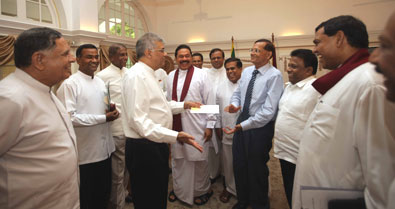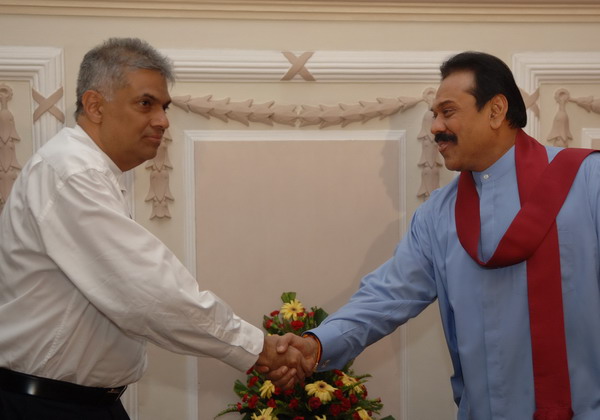The elusive game changer in Sri Lanka’s politics
However much the Opposition in general or the United National Party in particular, tries to

Frenemies? Opposition leader Ranil Wickremasinghe (L) greets External Affairs Minister G.L.Peiris (R) as President Mahinda Rajapakse and his brother Minister Basil Rajapakse including several other government stalwarts look on.
dislodge the present incumbent regiment, they will not succeed unless and until they find a game-changing issue.
Deified by some
If an issue is found that has the potential for changing the game, the issue itself will find a leader to lead the followers towards the change that is so desired. On the one hand, President Mahinda Rajapaksa presently sits pretty on one game-changing issue-the war victory. The Opposition does not seem to realize or they have deliberately chosen to disregard at their own peril, the significance and brevity of the issue of the war victory. Not only did President Rajapaksa deliver this ever-so-forceful solution to a war-torn nation, his political message, packaged in the most sugary coating on the one side and inflammatory patriotic wrapping on the other, has strengthened his standing among the Sinhalese Buddhists so profoundly that some even began to deify him on open stage.
Clever manipulations
Mahinda Rajapaksa himself is not a game-changer, yet he made use of an issue, the war victory, as a game-changing tool in all his political maneuverings. His clever manipulations paved the way for electoral victory after electoral victory and his cohorts, most ably supported by some extremely savvy propaganda specialists and messaging pundits, coined phrase after phrase to market the war-victory as an everlasting tribute to President Rajapaksa.
Fonseka politics and rewriting history
The incarceration of the General who was primarily responsible for the brilliant planning and immaculate execution of the war strategies and tactics, now seems like a necessary logical precondition to a well-connived plot to garner the entire credit of the war-victory to Mahinda Rajapaksa alone. Publication of a book, whose covert and overt purpose was to rewrite the history of the last three decades and distort the realities of the warfront, presents a warped view that the war was won solely due to the “brilliance” of the President’s brother.
Festering symptoms
Against this kind of a propaganda blitz, the Opposition and other civil organizations have no answer, at least in the short-run. The rampant corruption, breakdown in civil discipline, political interference in almost all spheres of rural life, unchecked nepotism, utterly disgraceful conduct on the part of some big-wigs in the officialdom, farcical handling of the distasteful affairs of the offspring of politicians’, comical errors committed in the field of education especially in the conduct of examinations, regular power outages in the recently-commissioned Norocholai power plant, importation of substandard fuel-all these maladies are but festering symptoms of a deeper social ailment whose condition seems to worsen on a daily basis outside the eye of the beholder.
Still popular
A ruler’s power among people is tested, in a democratic setting, at elections and the results of successive elections have clearly shown beyond any shade of doubt, the enormous power that Mahinda Rajapaksa holds and thanks solely to him, what is held by his minion cohorts too. Mistake after monumental mistake in the execution of statecraft has apparently not cost the regime one single vote. This phenomenal popularity of the President was rivaled by only one ruler in Sri Lanka’s post-Independence history: President R Premadasa.
Nationalism and Sinhala Chauvinism
The phenomenon of “Premadasa Exceptionalism”, about which I have written quite extensively on more than one occasion, is real. The one political trait that characterized “Premadasa Exceptionalism” which is even more predominantly evident in Mahinda Rajapaksa’s repertoire, is nationalism, in the latter’s case, bordering on Sinhalese chauvinism. While Premadasa’s chief constituency was the down-trodden masses, both urban and rural, Mahinda Rajapaksa has managed to cultivate the extreme nationalism appeal to the broad rural mass of the Sinhalese Buddhist populace. Both of them carried their respective political Parties on their shoulders to victory. However, Premadasa’s resilience in the late eighties and early nineties during the height of the war against the LTTE-led terror campaign was far more significant as against Mahinda’s campaign against the same enemy; for Premadasa did not have a General Sarath Fonseka leading the war effort nor were so much national treasures dedicated to the effort on the battlefront. Yet one cannot understate the enormous political leadership Mahinda Rajapaksa lent to the war effort.
LTTE sponsored boycott of elections in 2005
This issue of the war-victory is being used and abused by the current rulers, making it almost redundant with each passing day; but there is no sign of it fading anytime soon among the people, in fact its shelf life seems to extend, at least for one whole generation. So the war-victory, as it is being used as a single issue by Mahinda and his campaigners have been playing a very critical role in shaping the opinion of not only the average voter, but more importantly that of the opinion-makers. In fairness to the argument, it must be emphasized that the war-victory was not available to be used by Mahinda or his campaign staff in 2005 as a single issue platform. As a matter of fact, the single issue platform which was most vehemently propagated by the Mahinda Campaign in 2005 was the abolition of Executive Presidency. Despite the fact that the country was embroiled in a war against one of the most ruthless terrorist organizations in the world, he did not fight the Presidential Elections in 2005 on a single-issue platform such as a promise of war-victory. His main issue was the abolition of the Executive Presidency and he won, thanks mainly to the LTTE-monitored boycott of the Elections in the North and East.
War victory still a powerful tool in elections
Nevertheless, after winning the war and in subsequent elections ranging from Provincial to Parliamentary Elections, Mahinda and his coterie of supporters, both in the SLFP and outside, which included the Janatha Vimukthi Peramuna and Jathika Hela Urumaya among others, made use of this war-victory platform as a singular issue to drive the voters to the polling booths. Not only in the immediate aftermath of the war, but as recently as the last Provincial Council Elections which were held this month , it has been used to good effect.
Single issue campaigns
Therefore, it is abundantly clear that a single-issue campaign has a whole lot of advantages, amongst which are, ease of execution, focus being limited to one single theme or issue, avoidance of self-contradictory messaging and convenience of management, etc.
Erosion of UNP vote bank
Furthermore, the erosion of the UNP vote bank since 1994 has been steady and it seems to have settled at the 30% to 35% range. That is not a number from which a national political party can recover within one single electoral cycle. Especially in the context of the current leadership crisis that the UNP is enmeshed in, a recovery is not in the lingo of clever political pundits. The reasons for this dire mess the United National Party finds itself in, have been analyzed and over-analyzed during the last few months, particularly after the leadership struggle within the party reached a zenith last December when there was an open contest for the Party leadership.
Although some may argue that Ranil Wickramasinghe’s leadership style may be a reason for the Party’s poor performance at successive elections, it certainly is not the only reason. Replacing Ranil at the helm would not make the voters fall in line to vote for the UNP at the next elections. There might be a marginal increase in votes should a new leader take over the Party’s affairs. But Sajith Premadasa’s open and willing participation at the last Provincial Council Elections in Sabaragamuwa, North Central and Eastern Provinces did not help the UNP’s cause at all. The routing that the Party received in the Eastern Province is almost an insult to a Party that was once known as the major national political Party which was clearly identified with minorities in Sri Lanka from the days of D S Senanayake.
The defeat of Rajapakse the only common ground
The voter’s verdict is clear. The UNP’s chances of an electoral victory as a single political party are extremely slim or none at all. It reached 40% only in the Presidential Elections of 2010 and at that election, the candidate was General Fonseka and he represented a coalition of political parties whose only common ground of understanding was the defeat of Mahinda Rajapaksa.
The problem for the UNP
Hopelessly outspent by the Government Party, at least by 10 to 1, the UNP as a single Party/entity would not stand a ghost of a chance. Then the choice is clear. If the UNP is serious in becoming a realistic contender, it has to, as the leading protagonist, align itself with all other anti-UPFA elements in the country and contest on a single-issue platform at the next Presidential Elections for these diverse groups would not be able to agree on a common platform as their respective philosophies on the economy and the main national question, the ethnic issue, would differ widely.
Abolish executive presidency
Abolition of the Executive Presidency not only lends itself as a very pliable tool for all anti-Rajapaksa forces, it will also have a great amount of ground support, provided it is marketed as a first step towards the restoration of fast-diminishing fundamental rights of the people. It has the potential of being a real game-changer. The Opposition today is in dire need of a game-changer and they must be bold and creative enough to take that unconventional step in order to change the game in their favor.
One more thing: abolition of the Executive Presidency is a prerequisite to any meaningful social change that any political party could advocate in the current environment of stinking aroma of politics.

